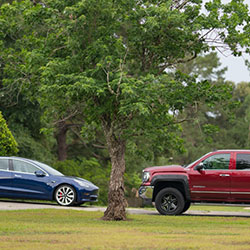 If you have two vehicles sitting in your driveway, it may be hard to decide which one to drive to work. If you work full-time, you could be commuting twice a day, five days a week, an average of four weeks a month, for 12 months a year. That is a lot of driving. So, this decision should not be based solely on which vehicle you prefer. It can also affect your wallet and your auto insurance.
If you have two vehicles sitting in your driveway, it may be hard to decide which one to drive to work. If you work full-time, you could be commuting twice a day, five days a week, an average of four weeks a month, for 12 months a year. That is a lot of driving. So, this decision should not be based solely on which vehicle you prefer. It can also affect your wallet and your auto insurance.
If you have a truck and a sedan, the choice is easy. Smaller cars can generally save you money, and who doesn't like that? Unless you are a plumber, contractor, or another professional who is required to move large material, regularly, you may want to leave your truck at home during the workweek.
Three Reasons to Leave Your Truck at Home
You are probably the go-to person when it's time for a friend to move or take their large articles to the donation centre. However, sitting in traffic or commuting large distances in your truck may not be as practical if you have a smaller second option.
According to Statistics Canada, 93 percent of commuters drive less than 60 minutes to work. However, those that do drive at least 60 minutes to work, drive a median average of 40 kilometres one-way.
Cities with close economic ties to metropolitan areas, such as Toronto, are more likely to have long-duration commutes. For example, one-fifth (18 percent) of commuters residing in Barrie reported driving at least 60 minutes to work, compared to the national average of seven percent.
If you are a long-distance commuter, here are three good reasons to leave your truck at home:
- Finding parking: A smaller vehicle can squeeze into those tight parking spots. This can be handy when there is limited parking, especially downtown.
- Save money on gas and maintenance: The sheer weight, size and power of a truck requires it to use a lot of gas and can wear out your tires faster than a lightweight vehicle.
- Insurance claims may be higher: Larger vehicles may cause more property damage or personal injury in the event of an accident. This may result in higher insurance claims associated with trucks or SUVs.
Three Benefits to Driving a Smaller Car
As for taking your sedan to work, not only can they be quite sporty looking, they can manoeuvre through traffic with ease.
Here are three reasons to drive your sedan to work:
- Affordability: Smaller sedans and compact cars are typically priced within a more affordable range, unless they are a luxury vehicle. This means the replacement value might also be less and your insurance may be cheaper.
- More seats: You can carpool a lot easier with a sedan. A standard car can hold five people, whereas a basic cab of a truck can only hold three. If you have an extended cab, which also holds five, you may pay even more in gas, maintenance, and insurance.
- Lower environmental impact: Cars that use less gas, produce fewer emissions.
How to Save Even More
There may be even more ways to save on your commute to work.
Leave work a little later
If you can adjust your work schedule or leave work 10 minutes later. It may save you more than just the agony of getting stuck in rush hour traffic.
According to Natural Resources Canada (NRCan), "Turn off your engine when you're stopped for more than 60 seconds, except when in traffic. The average vehicle with a 3-litre engine wastes 300 millilitres (over 1 cup) of fuel for every 10 minutes it idles."
Avoiding the bumper-to-bumper congestion can save you money in gas and you may actually get home around the same time, although you won't have been sitting in traffic.
Slow down
Slowing down and maintaining speed can reduce fuel consumption. Consider using cruise control for highway driving, when appropriate, and leave enough room between you and the car ahead. This way you can keep your speed steady and coast to decelerate.
NRCan did the math, "For example, at 120 km per hour, a vehicle uses about 20% more fuel than at 100 km per hour. On a 25-km trip, this spike in speed - and fuel consumption - would cut just two minutes from your travel time."
Compare quotes
Before you make your final decision, break it down. How much are your cars costing you in insurance, maintenance, and gas? Consider which car may depreciate the most with use and compare car insurance quotes for both vehicles. At Kanetix.ca you can compare quotes instantly.




